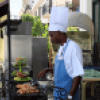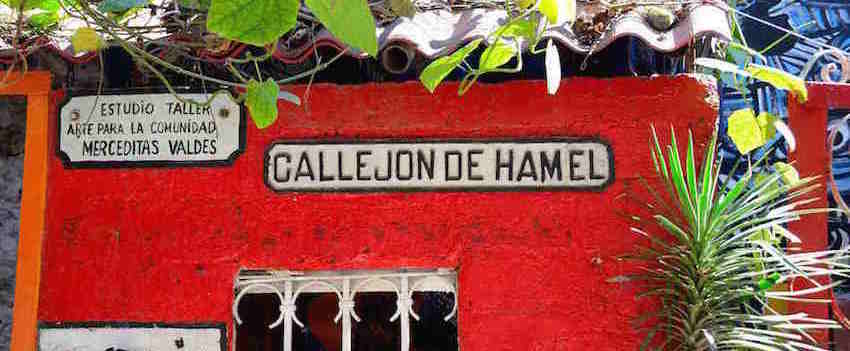- Posted by lvikander
- Category:
- 0 Comments
5 Must Do’s in Havana:
The exotic capital city of Havana is full of sights, sounds, smells and colors. When you only have a few days it’s hard to know what to do, but veteran traveler Howie Axelrod has narrowed down the list to five can’t miss spots.

View of one of the many colorful buildings in Plaza Vieja as seen from Café Escorial.
1) Have a cup of coffee at Café Le Escorial (317 Mercaderes) or Café O’Reilly (Calle O'Reilly 203) – Begin your day with a cup of quality Cuban coffee. If you are a lover of the bean, this is where to go. Cuban shade grown coffee is amongst the worlds finest. Even in Havana it is difficult to find, as these beans are exported to Europe and Asia where they can demand a steep price. But Café el Escorial and Café O’Reilly have the goods. Although the former is my favorite, both have great java and unique ambiance. At Escorial you can sit on the deck right on the magnificent Plaza Vieja and admire the beautiful architecture and people watch. O’Reilly is in a charming building along a side street where day-to-day life in Havana surrounds you. Being a few blocks apart, you may wish to start the day with a “double feature” and try a little something and both.
Insider Tip: If your desire is to bring home high quality Cuban coffee, look no further. Each cafe roasts Cuba’s finest beans in the morning and bags are for sale throughout the day. There is often a line of locals waiting to buy a bag, as Cubans love good coffee, but it’s absolutely worth the wait.

2) Go back in time at Memorias Libreria (57 Animas) – You will not find this shop in the tourist guides. Memorias is an absolute jewel and a unique museum unto itself. Baseball cards, coins, music, 1950’s posters, tobacco art, old postcards, books, photos, magazines, Cuban currency, art, and so much more line the walls and shelves in this small but charming shop. Memorias has perhaps the best collection of Revolutionary memorabilia in all of Cuba. I purchased a beautiful set of uncirculated Cuban banknotes, an album of collectable cards about the Revolution (“Album de la Revolucion Cubana 1952 – 1959”), and an original 45-RPM recording of one of Fidel’s speeches. The bilingual staff is friendly and knowledgeable. This is a unique shop, and easily worthy of 30 to 40 minutes of browsing.

The main dining room at AMOS Paladar and Photography Studio.
3) Dine at AMOS Paladar and Photography Studio (Calle Amistad # 203) – There is more to Havana than rice and beans amigo. AMOS is part of the new wave of private enterprise restaurants in Cuba known as paladars. The food here is top notch and the ambiance exquisite. You are dining in the working photography studio of Alex Castro (Fidel’s son) and Ramses Batista (no relation to the former dictator). Alex has written several books about his father after his retirement, and both are outstanding photographers. You will dine alongside the studio lights and camera equipment of these two professional photographic artists. The walls are covered with their beautiful photos. Did I mention that the food here is superb? I have been to 15 paladars in Havana, and AMOS is quite possibly “El Número Uno.”

A mural in Callejón de Hamel - aka Hamel’s Alley.
4) Experience Callejón de Hamel - aka Hamel’s Alley (between Calle Aramburu and Calle Hospital on Hamel) -This two-block area in Centro Habana (Central Havana) consists of an outstanding Afro-Cuban community art project. Created in 1990 by artist Salvador Gonzales Escalona, Hamel’s Alley is an inspiring example of how one man’s vision can transform a neglected neighborhood into a creative cornucopia of color, culture and art. Hamel’s Alley is a visual paradise. The project is alive with sculptures, murals, small unique shops and the like. On Sundays there is always music and dance. There are creative works of all types everywhere. Entire sides of four story buildings have been turned into colorful murals. There is even a small café here where you can enjoy a snack and coffee or a drink. The surrounding neighborhood here is dramatically different from many of the other parts of the city where restoration of buildings is underway.
Pro Tip: You are in the area where real Cubans reside and go about their daily lives. This area is much more rundown and rustic, yet it also the real Havana. After your visit, take a walk around the neighborhood. Havana is truly alive here.

Mosiacs and sculptures in Fusterlandia.
5) Visit Fusterlandia – (Jaimanitas – just outside of Havana) - Fusterlandia is another neighborhood art project, but thematically different from Callejón de Hamel. In 1975 after moving into this impoverished neighborhood, Cuban artist José Fuster set about to create a unique creation in art and sculpture. You are stepping into another world here, so expect the unexpected. You are inside a kaleidoscope. Dreamy folk-art themes surround you. The shapes are unconventional, flowing, colorful, whimsical and childlike. Upon completion of his initial project Fuster asked the neighbors and businesses around him if they would become part of his vision and decorate their properties. Over time the entire area become part of Fusterlandia and took on a life of its own. It is still evolving, and encompasses homes, storefronts, offices, benches, fountains, sculptures, murals and more. The entire neighborhood is a living art project and is totally authentic. You have never seen anything quite like this. Fusterlandia is a little farther from downtown Havana, but well worth the trip.
-Blog and Images by Howard Axelrod
Howard Axelrods Bio:
Howard Axelrod is an Ashland, Massachusetts resident, travel photographer, writer, and former high technology executive. He has photographed in 82 countries on six continents, and has travelled to 38 of the U.S. states. He is primarily interested in native and tribal cultures, architecture, and wildlife which he feels are all disappearing at an alarming rate. His goal is to document through photographs and writing as much of this as possible, while it still exists. He can be reached at highwind@verizon.net














